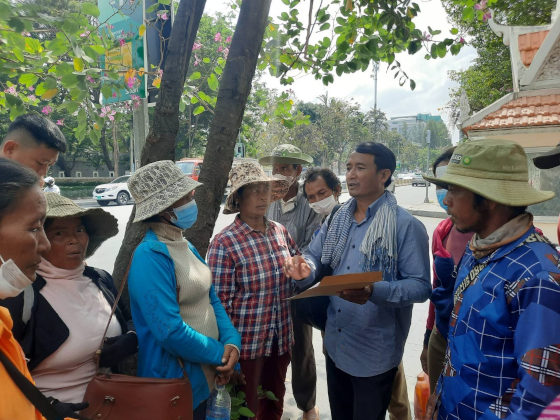
Sang and other community members from Tbong Khmum province gather outside the Ministry of Interior to call for a resolution to their decade-long land dispute.

Land rights activist (Srae Prang community), Tbong Khmum province
Land grabbing, giveaways, and forced evictions remain rampant in Cambodia. Enormous swathes of land have been seized for the benefit of politically connected individuals and powerful corporations. Economic Land Concessions (ELCs) are large-scale land leases granted to companies for agro-industrial development and have been one of the primary cause of land conflicts – including forced evictions and land grabs – since the mid-2000s, impacting hundreds of thousands of people. Families have been forcibly displaced, and entire communities deprived of their homes, histories and livelihoods. Land activists and environmental defenders face severe backlash for speaking out against these vast land grabs and giveaways. Sem Sang is one of them.
“I was born in Srae Prang, and was originally a farmer,” Sang begins. Sang’s family, along with roughly 600 other families from several communities in Tbong Khmum province’s Dambae district, are embroiled in a decade-long dispute with Harmony Win Investment Co. Ltd., a Chinese-owned rubber company. The company’s occupation of the land has been supported and enforced by the state, and the company has since claimed the communities’ farmland and communal forests. Witnessing such violations encouraged Sang to act.
Please stand strong in your positions, and help our country. Rights and power aren't gifted to us. If we don't struggle for them, they won't give them to us.
“[Companies] belonging to tycoons or senior officials encroach upon our land in collusion with local authorities,” says Sang. “They could potentially grab the land of the entire community in Srae Prang village." Sang’s ambition as an activist is straightforward: to protect land that rightfully belongs to communities, and secure those rights by obtaining hard land titles.
Sang has seen numerous evictions and the devastating impact they have on villagers’ ability to sustain themselves and their families. According to the Land Law, communities that have occupied land for over five years prior to 2001 are entitled to certain protections. Yet, land authorities have signed away his community’s lands despite the communities having occupied the land for generations. “When we had land, we could cultivate it to support our children. We could fish, or farm cassava and bamboo,” he says.
Sang acknowledges that land activism is difficult. Much of his activism involves rallying community members and coordinating their efforts to defend their land rights. “I sometimes have to travel to Phnom Penh or the provinces to submit petitions. It takes time. We struggle and endure so much,” he says. “I also have to look after my family. There is a shortage of food to eat, and not enough money to send our children to school."
Sem Sang speaks from LICADHO's provincial office in Kampong Cham.
Sang has been personally harassed by hostile companies and corrupt authorities for his activism, and says that he has lost track of the number of charges laid against him. He offers one example of how he and other villagers were once charged with possession of illegal firearms after being framed by commune and district authorities, who had hidden AK-47 assault rifles in the forest around 2017 or 2018.
While Sang was in prison, military police were deployed to his community where they arrested and physically assaulted both male and female villagers.
Sang explains that the forest area was being razed with fire during that period, meaning that the rifles would have been damaged had the villagers been in possession of them at the alleged time. Yet, the weapons were found intact, wrapped in a plastic bag and left under a coconut tree. “That made people feel afraid. Some stop protesting because of the risk of criminal complaints.”
Sang maintains that such charges are politically motivated, and he remains steadfast in defence of his community. He was ultimately imprisoned for two years following his appeal to the Tbong Khmum Appeal Court. The Supreme Court found him innocent in 2022, but Sang had already served his time by this point. “Being in prison was always difficult. You never want to be in prison. It was crowded, there were skin rashes, and there was no clean water. There was not enough food.”
While Sang was in prison, military police were deployed to his community where they arrested and physically assaulted both male and female villagers.

Sang and other community members from Tbong Khmum province gather outside the Ministry of Interior to call for a resolution to their decade-long land dispute.
Sang has also refused bribes from officials who have attempted to end his activism. “A senior official in Phnom Penh once phoned me. I will not reveal his name, but he asked me to talk to people and tell him if they wanted money. And to me, he said, “If you want a flat or car, you can tell me. How much do you want?” When bribery does not work, they use the court system to stop us.” Sang’s devotion to his community is clear: “I do not take bribes. The community land belongs to everyone, not to me alone.”
Sang mentions the financial toll of his activism. “I am in debt [with a microfinance institution] for $8,000,” he says. Sang has been forced to sell half of his land – about 1.5 hectares – to meet his repayments. He adds that microloans are supposed to improve people’s lives, but that it is not happening.
When asked how he is able to overcome these challenges, Sang’s response is frank: “I continue my journey because my children had to leave school during my two-year imprisonment. I could not help my family. Our livelihoods are limited. We must find a solution.”
Sang’s advice to activists is this: “Please stand strong in your positions, and help our country. Rights and power aren't gifted to us. If we don't struggle for them, they won't give them to us.”